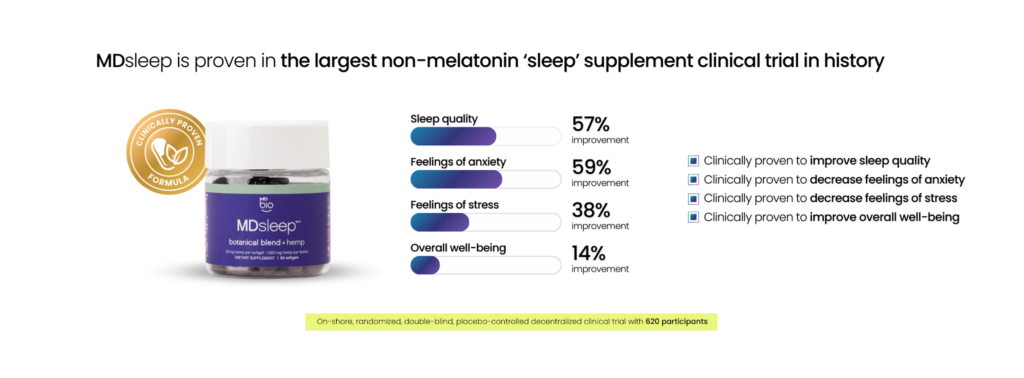

PhotoCredit_emilio sanchez hernandez_pexels
Are you struggling to fall asleep and stay rested? Over-the-counter sleep aids like valerian root can improve sleep quality, but understanding their effects is crucial. Ignoring proper usage or combining remedies carelessly may lead to harmful interactions or unwanted side effects.
Here, you’ll discover the science behind valerian root, how it works, and how to safely pair it with MD Sleep aid for restful, uninterrupted sleep.
Historical Use of Valerian Root
Valerian root has been used for centuries, primarily for its calming effects and ability to aid sleep. Its role in traditional medicine spans various cultures and periods.
Valerian root comes from the Valeriana officinalis plant, often called “all heal” or “garden heliotrope.” This plant is native to Europe and Asia, though it also thrives in parts of North America.
Valerian is commonly used to address issues like insomnia, anxiety, depression, PMS, menopause symptoms, and headaches. Its medicinal benefits stem from the roots and underground stems (rhizomes).
Active Compounds in Valerian Root
Valerian root contains several active compounds, which are key to its sedative and calming properties. Valerenic acid is a prominent component that promotes relaxation in the central nervous system. The herb also consists of valepotriates, another group of compounds contributing to its effect on sleep quality.
Additionally, volatile oils found in valerian are thought to be responsible for its soothing aroma and further enhance its sleep-inducing capabilities. Throughout history, these components have collectively established valerian root as a well-regarded natural remedy for aiding sleep and relaxation.
Valerian is also an ingredient in some sleep supplements, combined with other beneficial ingredients for enhanced effects.
Valerian Root for Sleep
Valerian root, derived from the Valeriana officinalis plant, has been used for centuries as as natural remedy to imrove sleep and alleviate insomnia. This section explores how valerian root aids in sleep enhancement, examines relevant scientific studies and compares it with other sleep aids.
How Valerian Root Promotes Sleep
Valerian root contains compounds believed to calm the nervous system and promote relaxation. It increases gamma-aminobutyric acid (GABA) levels in the brain, a key neurotransmitter that helps reduce nerve activity and induce sleep. This mechanism is similar to prescription sleep medications but without the grogginess.
Typically available in capsules, teas, and extracts, valerian root is a popular herbal choice for those seeking a natural alternative to improve their sleep patterns.
Scientific Studies on Valerian Root for Sleep
Several studies have investigated valerian root’s effectiveness in treating sleep problems. A 2021 study found higher quality sleep in participants who took 530 mg of valerian root an hour before bedtime. Despite such findings, some clinical trials report mixed results, highlighting variability in individual responses.
Factors such as dosage, preparation method, and duration of consumption can affect its efficacy. Research continues to address these inconsistencies, providing a deeper understanding of the valerian root’s potential benefits.
Comparing Valerian Root with Other Sleep Aids Chart
|
Criteria |
Valerian Root |
Melatonin |
Prescription Sleep Aids |
|
Mechanism |
Increases GABA levels |
Regulates sleep-wake cycle |
Varies (e.g., GABA receptor agonists) |
|
Side Effects |
Rare, sometimes Mild stomach irritation if taken without food |
Drowsiness, dizziness |
Dependence, morning drowsiness |
|
Onset of Effect |
2 hours to a few days of regular use |
30 minutes to 2 hours |
30 minutes to 1 hour |
|
Dependency Risk |
None |
Low |
High |
Valerian root offers a natural alternative with potentially fewer side effects compared to some conventional sleep aids. Its effectiveness may vary, emphasizing the importance of individual evaluation and consultation with healthcare professionals when considering its use.
Using Valerian Root Safely
Valerian root is often used to aid sleep and relaxation. Still, it’s essential to be aware of dosages, possible side effects, and interactions with other substances to use them effectively and safely.
Recommended Dosages
The valerian root dosage can vary based on individual needs and the specific formulation of the supplement. Generally, taking 400-600 mg before bedtime is recommended to aid with sleep. Some studies suggest that taking it regularly over a few weeks may increase its effectiveness.
For best results, users should follow the guidelines on the supplement packaging and consult with a healthcare provider to ensure the dosage is suitable for their specific health conditions or needs.
Potential Side Effects
Valerian root is usually considered safe for most adults, but it can cause rare side effects in some users. A very low number of users have reported headaches, dizziness, and stomach problems when taken without food. In some cases, it may lead to increased sleeplessness rather than alleviating it.
According to the Mayo Clinic, those with liver disease or who are pregnant or breastfeeding should avoid it. Users should also stop taking it if they notice any adverse reactions and consult a doctor if necessary.
Interactions with Other Substances
Valerian root may interact with various medications, particularly sedatives, anti-anxiety drugs, and other sleep aids. If you take Valerian Root with other sleep aids, purchase a clinically validated formula such as MDsleep, designed and tested by physicians. Those using such medications should avoid combining them with valerian as it can enhance their effects, potentially leading to excessive drowsiness or impaired functioning.
The Sleep Foundation advises caution with the combination of sleep aids, so choosing a scientifically formulated sleep aid is essential. It’s important to discuss any potential interactions with a healthcare provider, especially for those taking prescription sleeping pills.
Shop MDsleep
Find sleep aids that were designed by doctors and validated by research.
Combining Valerian Root with Other Sleep Aids
Valerian root is frequently combined with other natural sleep aids to improve effectiveness. It’s essential to understand the role of different components and the necessity of professional guidance when mixing herbal supplements for sleep enhancement.
MDsleep Optimized Valerian Root Formula is Safe
MDsleep offers an optimized formula of valerian root designed to be both safe and effective. The formulation is tailored to enhance the natural calming effects of valerian root, providing a potential alternative to more potent, synthetic sleep aids. This blend minimizes adverse effects by ensuring proper dosages and using high-quality ingredients.
MDsleep supports the body’s natural sleep patterns by employing a balanced approach. When selecting a valerian root supplement, it’s vital to consider such professionally formulated options to ensure safety and efficacy.
MDsleep Sleep Aid Ingredients
MDsleep’s sleep aid combines valerian root with other natural ingredients to aid sleep in the MDsleep +hemp and MDsleep Botanical (hemp free) versions. In a recent clinical trial, MDsleep + hemp has been found to reduce feelings of anxiety and stress while increasing the quality of sleep after only a few weeks of regular use.
Full Spectrum Hemp MDsleep + Hemp Ingredients
MDsleep’s Full Spectrum Hemp version incorporates hemp-derived compounds, enhancing its sleep-inducing properties. It also utilizes valerian root, lavender, hops, and a mix of natural ingredients known for their calming effects, such as GABA and L-Theanine. Hemp is recognized for its potential to promote relaxation and improve the quality of rest.
The combination of hemp with other sleep-supportive ingredients can help ease anxiety and stress, which are common barriers to a restful night’s sleep.
This formulation targets individuals interested in natural sleep solutions with additional benefits. It’s crafted to offer a calming effect, improving sleep duration and depth, making it a suitable option for mild sleep assistance without harsh chemicals.
MDsleep hemp+ Key Ingredients List
- Full Spectrum Hemp with CBD and CBN
- Valerian Root
- GABA
- L-Theanine
- Hops
MDsleep Botanical (Hemp Free) Version Ingredients
The Botanical version of MDsleep offers a hemp-free alternative that still provides adequate sleep support. It focuses on botanical extracts such as valerian root, lavender, and hops and a mix of natural ingredients known for their calming effects, such as GABA and L-Theanine. This version is ideal for individuals who prefer plant-based solutions without including hemp.
By leveraging the power of botanicals, this formulation aims to relax the body and mind, allowing a gentle transition into sleep. It’s particularly suitable for those who value natural ingredients and want an option that aligns with their preferences.
MDsleep Botanical Key Ingredients List
- Valerian Root
- GABA
- L-Theanine
- Hops
Caution in Combining Valerian Root with Other Sleep Aids on Your Own
Combining valerian root with other sleep aids independently can pose risks. Interactions with substances like alcohol or benzodiazepines can increase sedation, making it essential to avoid such combinations without medical supervision. Over-sedation or unexpected side effects can occur if inappropriate dosages are used.
It’s advisable to consult a healthcare provider before starting any new combination of sleep aids. A professional can help tailor a regime safely and effectively, ensuring that the synergy of combined supplements achieves the desired sleep-enhancing results without compromising safety.
Purchasing and Quality Considerations
When purchasing valerian root, it’s crucial to consider both quality and sustainability. Ensuring that you select high-quality valerian root can impact its effectiveness and safety. Moreover, being mindful of the sourcing practices helps maintain environmental balance.
Identifying High-Quality Valerian Root
High-quality valerian root ensures better efficacy and safety. Key aspects to check include purity and potency. Products should come with certifications from reputable organizations that conduct third-party testing. This provides the valerian root with a consistent strength and is free from contaminants.
The form in which valerian root is available matters. Choices like capsules and tinctures offer convenience with precise dosing. Always check the label for clear information on the dosage and form to avoid incorrect usage.
Sourcing and Sustainability
Considering the source of valerian root helps in making environmentally conscious choices. Suppliers committed to sustainable practices can prevent the overharvesting of wild populations. Look for certificates like Fair Trade or organic certifications, indicating responsible and sustainable sourcing.
Additionally, ethical sourcing ensures that local communities are supported through fair wages and safe working conditions. Consumers can contribute to the sustainability of medicinal plants by selecting brands that emphasize eco-friendly practices, thus helping preserve valerian roots for future generations.
Frequently Asked Questions
Valerian root is often used for sleep enhancement and has been shown to improve sleep quality potentially. Below are some common questions regarding its use, including dosage recommendations, possible side effects, and interactions with other medications.
What is the recommended dosage of valerian root to improve sleep?
Typically, valerian root is taken in doses ranging from 300 to 600 mg, about 30 minutes to two hours before bedtime. It’s crucial to follow product-specific instructions or consult a healthcare provider to determine an appropriate dosage for individual needs.
Can taking valerian root regularly lead to dependency or tolerance?
Valerian root is generally considered non-addictive, and there are no substantial reports indicating dependency or tolerance from regular use. However, individuals should use it as directed and consult with a healthcare professional if concerned.
Are there any long-term side effects associated with using valerian root for sleep?
Long-term use of valerian root is still under-researched, but most individuals have found it safe for short-term use. Some people may experience mild side effects like headaches or dizziness. Consulting with a healthcare provider is advised for long-term use.
How quickly does valerian root take effect to relieve insomnia?
Valerian root may take several days to weeks to exhibit noticeable improvements in sleep quality. Individual responses vary, so consistent use over time is necessary to experience full benefits.
Can valerian root interact with other medications I might take for sleep or other conditions?
Valerian root can interact with medications that have sedative effects, including certain sleeping pills or anti-anxiety medications. It’s crucial to consult with a healthcare provider to ensure no adverse interactions with existing drugs.
Does valerian root cause weight gain as a side effect?
There are no established links between valerian root and weight gain. It is not typically associated with weight changes, though individual experiences may differ. If unusual symptoms occur, seeking medical advice is recommended.
Read Next
Best Cannabis for Sleep Guide
This resource reviews various cannabis-based sleep solutions, explaining how cannabinoids like THC, CBD, and CBN interact with the body to promote better rest. It provides insights into product types, dosing, and what to consider when choosing cannabis for sleep.
Read more
Shop MDBio Nutraceuticals for Sleep, Anxiety Relief, and Pain Relief
Browse MDBio Wellness’s full collection of natural supplements, including sleep aids formulated with botanicals and hemp blends. Each product is designed to support your central nervous system and promote overall well-being without harsh side effects.
Read more
Guided Sleep Meditation (Audio)
Experience a doctor-designed guided audio sleep meditation that promotes relaxation by progressively releasing tension throughout your body and calming your mind. Visualizations and affirmations help ease you into restful sleep, making it ideal for anyone seeking a peaceful bedtime routine.
Read more
Best Over-the-Counter Sleep Aids Guide
Learn about the most effective over-the-counter sleep aids, including their active ingredients, usage tips, and potential side effects. The guide helps you choose safe and suitable options for occasional sleeplessness or travel-related disruptions. With so many over the counter sleep aids to choose from, find out which ones actually work.
Read more
CBN vs. CBD vs. CBG for Sleep Guide
Discover the differences between CBN, CBD, and CBG, three cannabis-derived compounds, and how each may affect sleep quality. The page compares their unique properties, potential benefits, and which might be most effective for sleep support.
Read more
Types of Sleep Aids
Explore a comprehensive overview of sleep aids, from over-the-counter and prescription medications to natural remedies and sleep hygiene tips. Learn about the benefits, risks, and side effects of common sleep solutions, with guidance on choosing what’s right for you.
Read more

Kia Michel, MD
Physician
Kia Michel, MD is an urologist and staff surgeon at Cedars-Sanai Medical Center in Los Angeles. As a founding member of Comprehensive Urology in Beverly Hills, he believes in treating all aspects of a patient’s wellbeing in order to achieve optimal health. After 25 years in private practice, Dr. Michel believes that a good night’s sleep is essential to maintaining your health, which inspired him to co-create the MDsleep community and the Sleep Doctors Blog.
What Our Readers Say
“Thanks to the insightful articles, I’ve finally managed to get back to my old sleep routine. I feel more rested and energetic each day!”
“The blog’s advice on sleep hygiene has been a game-changer for me. I never realized how small changes could make such a big difference.”
“I struggled with insomnia for years, but the tips I found here have helped me sleep through the night consistently. Thank you!”
“I no longer feel like a zombie from The Walking Dead series! I finally have my life back.”
Stay Updated with Our Newsletter
Join our community of sleep enthusiasts! Subscribe to receive the latest blog posts and exclusive sleep tips straight to your inbox.
Follow Us for More Sleep Insights
Discover Better Sleep Solutions
Unlock the secrets to a restful night by exploring our expert-backed articles and join our vibrant community for personalized sleep tips.
List of References
- AASM Sleep Prioritization Survey: This survey by the American Academy of Sleep Medicine examines the use of melatonin among the public. It reveals trends and insights into how melatonin influences sleep patterns. For more information, visit AASM Sleep Prioritization Survey, Melatonin Use.
- Melatonin Overview: The A.D.A.M. Medical Encyclopedia provides a detailed entry on melatonin, discussing its role as a natural hormone and its applications in treating sleep disorders. More details can be found at Melatonin – MedlinePlus.
- Cannabinoids and Sleep: A study by Kaul, Zee, and Sahni reviews the effects of cannabinoids on sleep and their potential therapeutic roles in managing sleep disorders. This research can be accessed through Neurotherapeutics.
- Insomnia and Substance Use Disorders: Arnedt discusses insomnia in individuals with substance use disorders, highlighting how these conditions interact. This information is available in UpToDate at Insomnia in Patients with a Substance Use Disorder.
- Clinical Trials of Cannabinoids: Kuhathasan et al. provide a critical review focusing on clinical trials that investigate cannabinoids for sleep improvement. For full access, check Experimental and Clinical Psychopharmacology.
- Cannabis and Sleep Literature Review: Babson, Sottile, and Morabito explore the relationship between cannabis, cannabinoids, and sleep through a literature review. Find their findings in Current Psychiatry Reports.
- Cannabidiol (CBD) Information: This entry from the A.D.A.M. Medical Encyclopedia details CBD, a compound from cannabis known for its potential benefits in sleep enhancement. More information is at Cannabidiol (CBD) – MedlinePlus.
- Magnesium for Insomnia: A systematic review and meta-analysis by Mah and Pitre investigates the impact of oral magnesium supplementation on insomnia in older adults. Read about it in BMC Complementary Medicine and Therapies.
- Dietary Magnesium: The A.D.A.M. Medical Encyclopedia discusses the role of magnesium in diet, emphasizing its importance for sleep and overall health. Further details are provided at Magnesium in Diet – MedlinePlus.
- Safe Natural Sleep Aids: Rao et al. investigate various natural sleep aids available in the market, searching for effective options for sleep improvement. The study is accessible at Journal of the American College of Nutrition.
- Theanine’s Effect on Sleep: Baba and colleagues explore how theanine influences sleep quality, particularly in young women affected by caffeine-induced wakefulness. More can be found in Food & Function.
- Theanine Complex and Sleep Quality: Research by Dasdelen et al. presents findings on a novel theanine complex that improves sleep quality. It is published in Frontiers in Nutrition.
- Glycine and Sleep: Kawai et al. study the effects of glycine on sleep and the brain, focusing on how it may assist with sleep disorders. Details can be found at Neuropsychopharmacology.
- Valerian Root Information: Shane-McWhorter provides insights into valerian as a natural sleep aid, detailing its usage and effects in the Merck Manual. Visit Valerian – Merck Manual Professional Version.


